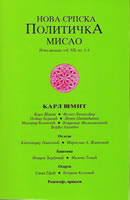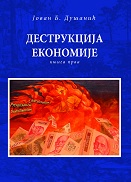| NSPM in English | |||
The Kosovo effect (The Guardian) |
 |
 |
 |
| понедељак, 21. април 2008. | |
|
The Guardian – London , April 21, 2008 I opposed intervention in Kosovo in 1999. I was right to do so: it made things worse on the ground and set a dangerous precedent Kosovo's recent unilateral declaration of independence brought back memories. I publicly opposed Nato's attack on Serbia - carried out in the name of protecting the Kosovans from Serb atrocities - in March 1999. At that time, I was a member of the opposition front bench in the House of Lords. The then Conservative leader, William Hague, immediately expelled me to the back benches. Thus ended my (minor) political career. Ever since, I have wondered whether I was right or wrong. I opposed military intervention for two reasons. Firstly, I argued that while it might do local good, it would damage the rules of international relations as they were then understood. The UN charter was designed to prevent the use of force across national lines except for self-defence and enforcement measures ordered by the security council. Human rights, democracy, and self-determination are not acceptable legal grounds for waging war. Secondly, I argued that while there might be occasions when, regardless of international law, human rights abuses are so severe that one is morally obliged to act, Kosovo was not such a case. I considered the "imminent humanitarian disaster" that the intervention was ostensibly aimed at preventing, to be largely an invention. I further argued that non-military means to resolve the humanitarian issue in Kosovo were far from being exhausted, and that the failed Rambouillet negotiation with Serbia in February-March 1999 was, in Henry Kissinger's words, "merely an excuse to start the bombing". This view was vindicated by the Organisation for Security and Cooperation in Europe 's (OSCE) report on human rights violations in Kosovo, published in December 1999. The report showed that the level of violence fell markedly when OSCE monitors were placed in Kosovo following the Holbrooke-Milosevic agreement of September 23 1998; and that it was only after the monitors were withdrawn on March 20 1999, in preparation for the bombing, that general and systematic violation of human rights began. Between March and June 1999 - the period of Nato bombing - the number of deaths and expulsions in Kosovo shot up. The "humanitarian disaster" was in fact precipitated by the war itself. Despite this, the term "genocide", freely bandied about by western interventionists, was grotesquely inappropriate at any time. Without doubt, Nato air strikes and the subsequent administration of Kosovo as a protectorate improved the political situation for Albanian Kosovans. Without Nato intervention, they probably would have remained second-class citizens within Serbia . Against this must be set large-scale deterioration in the economic situation of all Kosovans, Albanian and Serbian (44% unemployment), widespread criminalisation, and the fact that under Nato rule, Kosovo was ethnically cleansed of half its Serb minority. Kosovo remains in political limbo to this day. Two thousand EU officials run the country, and 16,000 Nato troops guard its security. Its "independence" is rejected by Serbia , unrecognised by the security council, and opposed by Russia , China , and most multi-national states in Europe and Asia , which fear setting a precedent for their own dismemberment. Indeed, Russian foreign minister Sergei Lavrov was quick to blame the disturbances in Tibet on Kosovo's declaration of independence. A Serbian insurgency and de facto partition of Kosovo remain possible, and we have yet to face the destabilising effects of Kosovo's claim to independence on other divided Balkan states such as Bosnia and Macedonia . But the balance sheet is even worse in terms of international relations. Kosovo was a stalking horse for Iraq , as the doctrine of humanitarian intervention morphed into George Bush's doctrine of "pre-emptive war", by which the US claimed the right to attack any state that it deemed a threat to its national security. As then-UN secretary general Kofi Annan rightly argued, this opened the door to the proliferation of unilateral, lawless use of force. Not the least damaging consequence of the Bush doctrine is that it dispenses with the need for public proof of aggressive intent. The Iraq invasion was justified by the same use of fraudulent evidence as was displayed in Kosovo. On balance, I believe that I was right to oppose the Kosovo war. It was a regressive answer to a genuine international problem: how to hold together multi-ethnic, multi-religious states in a reasonably civilised way. Since 1999, Kosovans have rejected Serbian offers of autonomy, because they were confident of American support for independence. Western countries must consider more seriously how far they should press their human rights agenda on states with both the power and the will to defend their territorial integrity. Under American leadership, it is the west that has emerged as the restless, disturbing force in international affairs. China should certainly grant Tibet more autonomy; but is pumping up the Dalai Lama into a world leader or threatening to boycott the Beijing Olympics the best way to secure a better deal for Tibetans, or to obtain Chinese cooperation on matters that are far more important than Tibet 's status? Activists, impassioned by the justice of their cause, will not consider these questions. But world leaders should take them seriously. With the cooperation of Project Syndicate, 2008.
|
Од истог аутора
Остали чланци у рубрици
- Playing With Fire in Ukraine
- Kosovo as a res extra commercium and the alchemy of colonization
- The Balkans XX years after NATO aggression: the case of the Republic of Srpska – past, present and future
- Из архиве - Remarks Before the Foreign Affairs Committee of the European Parliament
- Dysfunction in the Balkans - Can the Post-Yugoslav Settlement Survive?
- Serbia’s latest would-be savior is a modernizer, a strongman - or both
- Why the Ukraine Crisis Is the West’s Fault
- The Ghosts of World War I Circle over Ukraine
- Nato's action plan in Ukraine is right out of Dr Strangelove
- Why Yanukovych Said No to Europe

.jpg)




















